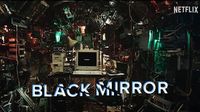As fans dive into the latest season of the acclaimed anthology series Black Mirror, they are met with a striking shift in tone and subject matter. Creator Charlie Brooker has returned with a seventh season that not only critiques technology but also explores how to cope with the present reality it creates. The season, which began streaming on April 10, 2025, features six episodes that delve into the complexities of modern life, offering a mix of poignant storytelling and a critique of the subscription economy.
When Black Mirror first premiered in 2011 on Channel 4, it was known for its dark, dystopian narratives that often felt like cautionary tales about the future of technology. The first episode, “The National Anthem,” set the tone with its shocking premise involving a British prime minister being blackmailed into performing a grotesque act to save a kidnapped princess. Over the years, episodes like “Fifteen Million Merits” and “The Entire History of You” explored themes of exploitation and memory, capturing the public’s imagination and sparking discussions about the implications of technology.
Fast forward to 2025, and the new season presents a more nuanced perspective. The first episode, “Common People,” focuses on Amanda (Rashida Jones) and her husband Mike (Chris O'Dowd), who find themselves entangled in a healthcare nightmare after Amanda is diagnosed with a terminal brain tumor. They turn to a medtech startup called Rivermind, which promises to preserve Amanda’s consciousness through an expensive subscription service. This episode serves as a critique of the subscription economy, illustrating how the most vulnerable can be exploited in a system that prioritizes profit over people.
“Common People” highlights the absurdity of a world where life itself can be commodified. As Amanda's condition deteriorates due to the limitations of their lower-tier subscription, she begins to recite advertisements involuntarily, illustrating the dehumanizing effects of such a system. This chilling narrative resonated with viewers, prompting some to cancel their Netflix subscriptions in protest. One viewer expressed on social media, “New Black Mirror episode made me cancel my Netflix subscription. I feel terrible.” Another added, “Sorry, Netflix, you did it yourself.”
Brooker's shift in focus from dystopian predictions to coping with the present reflects a broader societal sentiment. In a recent interview, he stated, “If you want that, there’s a 24-hour panel showing it called your window. You don’t necessarily want to see something saying: Things are going to get worse.” The season embraces a tone of resilience rather than despair, emphasizing the importance of human connection even amidst technological chaos.
The second episode, “Bête Noire,” continues this exploration of memory and identity. It features Maria (Siena Kelly), who faces the return of a former classmate, Verity (Rosy McEwen). The episode raises questions about altered memories and the impact of past relationships on our present selves. This narrative, while less shocking than the first, still engages with the theme of how technology influences our understanding of reality.
In “Hotel Reverie,” Issa Rae stars as Brandy Friday, an actress trapped in an AI-driven reinterpretation of a classic film. This episode cleverly intertwines elements of classic cinema with modern technology, exploring the implications of AI in the entertainment industry. Rae’s performance, alongside the episode’s thought-provoking premise, reinforces the season’s theme of finding joy and fulfillment amid technological constraints.
“Plaything,” featuring Peter Capaldi as Cameron, delves into nostalgia and the dangers of technology through a mysterious video game. The episode presents a moral dilemma about the relationship between humans and AI, culminating in a haunting twist that serves as a reminder of the consequences of our technological dependencies.
“Eulogy,” perhaps one of the most emotionally charged episodes, follows Phillip (Paul Giamatti) as he revisits memories of a lost love through innovative technology. This poignant exploration of grief and memory challenges viewers to reflect on their own relationships and the importance of closure. Giamatti’s performance delivers a powerful message about the human experience, making it one of the standout episodes of the season.
The season concludes with “USS Callister: Into Infinity,” a sequel to a previous fan-favorite episode. This installment revisits the digital universe where characters must navigate the complexities of a monetized gaming environment. The episode critiques the commodification of digital experiences, highlighting how profit-driven motives can lead to dire consequences for those trapped within these systems.
Overall, Black Mirror Season 7 marks a significant evolution in the series. By shifting its focus from foreboding predictions to the realities of contemporary life, it invites viewers to engage with the present rather than fear the future. The inclusion of diverse voices, particularly strong performances from Black women like Issa Rae and Rashida Jones, underscores the importance of representation in storytelling.
As fans digest the new season, they are left pondering not just the implications of technology but also their own humanity in an increasingly complex world. Brooker’s exploration of how we cope with the present, rather than merely warning us about the future, may be the most powerful message of all.







